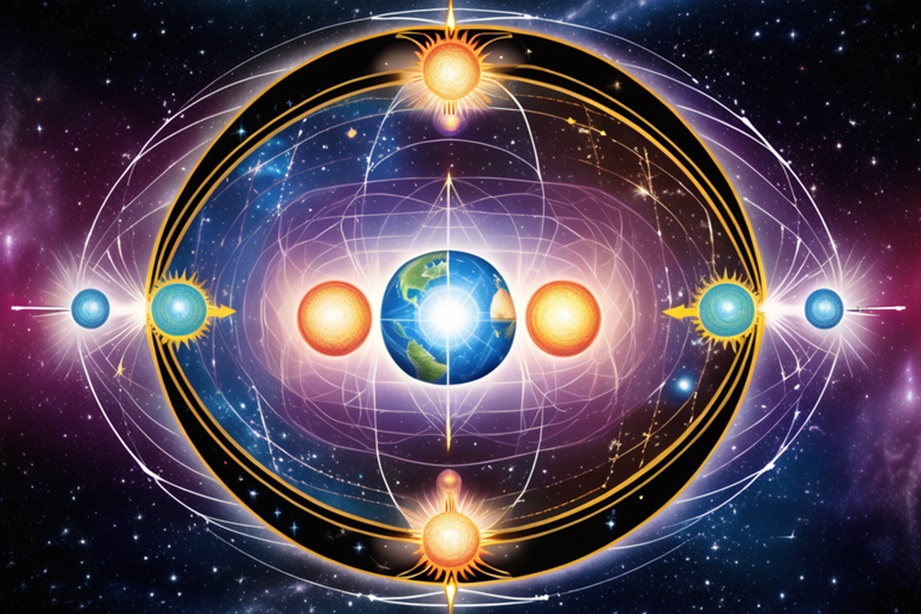As soon as we imagine that this self (this self that I think I am) can do something volitional, that it can actually ‘choose’ or ‘decide’, then samsara is born. This is a re-framing of a similar statement by one Tibetan teacher who says ‘when the self imagines it can get its own way in life then samsara is born’. Samsara is thus the illusion realm in which it seems that the self can get its own way, can make decisions and exercise choices…
This particular formulation of what samsara is tends to be rather perplexing, to put it mildly, since we don’t understand the basic premise, which is that the self can’t choose, can’t decide, can’t exercise genuine volition in the way that it thinks it can. If there ever was an obstacle to understanding, this is it. Our fundamental perception is that we can either choose X or choose Y; that we can freely come up with any goal we want and then strive to obtain it. It is no understatement to say that the whole of our life is based upon this premise!
Get rid of this perception and what do we have left to us? Nothing that we can feel good about, anyway! Nothing that we can obtain any feeling of satisfaction from. If we are deriving satisfaction from our purposeful activity then – as we have just said – this is because an illusion realm has just become real for us, the illusion in question being [1] That I am this self, and [2] That this self has the power of choice.
If I start to think that I do have choices and that I can – if I am clever enough, resourceful enough, or persistent enough – get things to work out for me then I am at this point launching full-tilt into the game that is samsara. What draws me on into the game is the good feeling that I know I am going to get when I succeed in making things happen the way I want them to. This coming together of ‘the way things are’ and ‘the way I want for them to be’ is ‘the bottom line’ – this is where all the satisfaction or dissatisfaction comes in. There is nowhere else for satisfaction to come in other than this conjunction of ‘goal’ and ‘reality’. As we all know very well, it is the obtaining of the satisfaction of getting it right and evading of the dissatisfaction of getting it wrong that constitutes the game. There’s nothing else in the game other than this!
This business of obtaining the satisfaction and avoiding dissatisfaction (by either getting one’s own way or failing to get it) is extremely compelling and it takes up most if not all of our time but it is however all hanging on a very precarious hook – the hook being that I am this self and this self has the power of choice.
Suppose that this insubstantial or precarious basis were to give way – what then happens to the game? If I don’t have the power of making decisions then how can I feel good about fulfilling the ‘choice’ that I have supposedly made but haven’t really? It’s only going to satisfy if it’s my choice and not some so-called choice that has already been decided for me, obviously enough. How for that matter can I feel disappointed in myself for failing to fulfil it? Winning is the same as losing in this case; success the same as failure….
If I didn’t choose the goal then it isn’t my goal and so I’m not going to feel any satisfaction in attaining it. But more than just this, if my goal was decided for me by some external factor and it was also decided by this same factor that I should ‘want’ it then this means that I don’t actually come into the picture at all. If there was no choosing then this means that there is no ‘chooser’! There was no choice and no one made it…
When we take the illusion of choice out of the picture therefore we also take away the illusion of the self – the purported agent that supposedly chooses. ‘Choosing’ and ‘the self’ are inextricable, inseparable, indistinguishable; they are the same thing. This experience of being a self which has choices, a self which chooses, is a phantom or mirage that is facilitated by the game, therefore. Or rather we could say that the choice-making self is a phantasmagorical experience that is brought into apparent being by the playing of the game, since the whole show is dependent upon us actually playing it. Conditioned existence isn’t ‘a thing in itself’ – it’s something we create for ourselves without realizing at the time that we are creating it.
The game supplies everything – it supplies the apparent choice, the apparent chooser, and the apparent good feeling that the apparent chooser apparent experiences when that apparent choice comes into (apparent) fruition. The game supplies the good feeling that I get when I get ‘my’ own way and it supplies the bad rotten feeling that comes when I don’t. And – into the bargain – it also supplies the wanting. It also supplies self that wants to get its own way. The game supplies the full package…
We could also try to explain the essential mechanics of this set-up by saying that the game operates by providing us with the euphoria that we enjoy when we experience ‘the self-that-we-think-we-are’ being validated by external circumstances, along with the dysphoria we experience when this self gets de-validated. This is the most essential way of looking at the mechanism by which the game works. The game-generated sense of self needs validating, obviously, because it isn’t actually real. It is (for this reason) in sore need of being validated! Validation is the sweetest balm there is for the self-which-we-think-we-are, and by the same token de-validation is the most terribly disagreeable and unwelcome thing there could ever be. Nothing is sweeter for the conditioned self than euphoria and nothing is as bitter for it as dysphoria, and yet euphoria and dysphoria are the very same thing when it comes right down to it. They are both projections (or reflections) of the ‘me’.
The idea that the game or system can validate its own constructs is course a laughable fallacy. The system’s validation of its own constructs is a perfectly meaningless, perfectly empty operation. It is a null-operation. And yet even though this is undeniably the case (who would be silly enough to try?) there is nevertheless a way in which the system can somehow manage to do just this. We know that there is a way in which the system (or game) can somehow manage to do this – we can see examples of people feeling pleased when they win at a game every day. We can also – just as easily – see examples of people being disgruntled (on an everyday basis) when they fail to win, when they fail to ‘get their own way’. Being pleased or displeased when we either do or do not get our own way is the single most observable fact of human psychology! The modalities of being either satisfied on the one hand or dissatisfied on the other are the two facets of unconscious existence; there is nothing else to unconscious existence other than being either being satisfied or dissatisfied, pleased or displeased. There exists nothing else as far as the life of the conditioned self is concerned other than either being validated or de-validated. That’s the long and the short of it.
We know that winning really does feel good and that losing really does feel bad when we are playing a game, and that this constitutes a very workable type of motivation. There is a kind of a sneaky trick going on here, all the same and this trick has to what Jung calls our ‘one-sideness’ – the way in which we can only see one opposite at a time, so to speak. We can see PLUS and we can see MINUS but we can’t see that PLUS equals MINUS. We can’t see the identity of the opposites. If we say that we are suffering from a peculiar blindness regarding the identity of the opposites this sounds – on the face of it – rather unfortunate, but from the point of view of us being able to carry on playing the game it is of course an absolutely essential thing. ‘One-sidedness’ (or ‘opposite-blindness’) is what the game is all about – the essential game that we’re playing is the game that the opposites have independent existence and therefore aren’t ‘one and the same thing’. All games come down to this…
The trick is that the game can validate itself, but only if it de-validates itself to exactly the same extent. The books always have to balance, as any accountant could tell you. Or as we could also say, the system can indeed validate some of its constructs, but only if it correspondingly de-validates others. The pluses and minuses all have to balance out, as any physicist will tell you. If you produce an electron that’s fine but you also have to produce a positron at the same time. In the same way therefore, the game can produce this thing called ‘winning’, but only if it produces ‘losing’ at the same time.
Whatever goes on in the game always cancels itself out later on and this is just another way of saying that nothing ever goes on in the game. The game isn’t real (games aren’t!) and so of course nothing ever goes on in the game! There’s no winning in the game just as there’s no losing, since the ‘net result’ is always zero. There’s no winning in the game just as there’s no losing, there’s just the temporary appearance of winning and losing. It’s all just a kind of mechanical, self-cancelling vibration. It’s all just ‘sound and fury’ which (as Shakespeare says) ‘signifies nothing’.
We started off by saying that there is no true volition in the game, despite the compelling illusion that there is. When we’re caught up in the game – when we’re ‘in the thick of it’ – then everything seems to hang on our choices. If we end up with a bad result then we can beat ourselves up at leisure for making bad choices’ – it seems perfectly legitimate to do so. More than merely ‘legitimate’, it seems obligatory that we should do. We are compelled to beat ourselves up for making bad choices just as we were compelled to do our utmost to win in the first place. The compulsive to succeed in the game is the same thing as the compulsion to recriminate against ourselves if we fail – all compulsions arise out of the very same illusion, which is the illusion that succeed and fail are two separate things!
Saying (as we have said) that the self only exists within the game that we are playing whilst not acknowledging that we are playing and that there is no actual volition (or freedom) within this game generally comes across as being sounds rather negative, rather nihilistic. Who wants to hear this? The point that we’re making however is that the game isn’t real anyway – there’s no such thing as ‘an absence of freedom’ or ‘an absence of true volition’. Freedom is all there is and whilst freedom contains the freedom to give away our freedom and play the game of ‘being this conditioned self’ (which is ‘negative freedom’) it also contains the freedom not to have to play this game, not to have to be this self…






